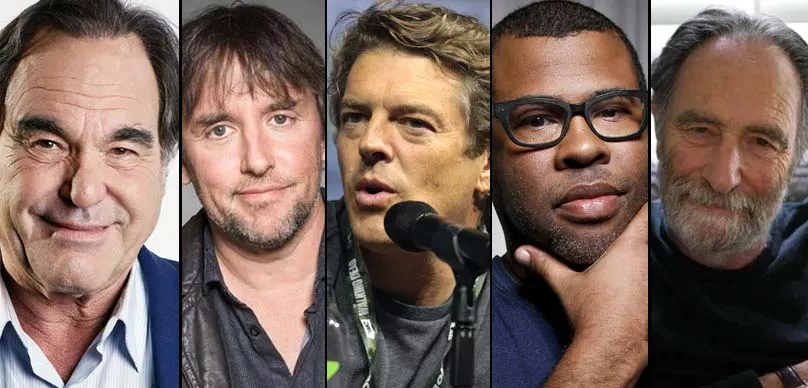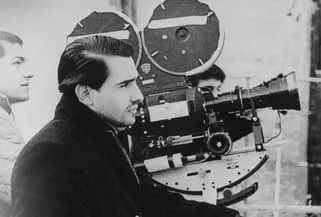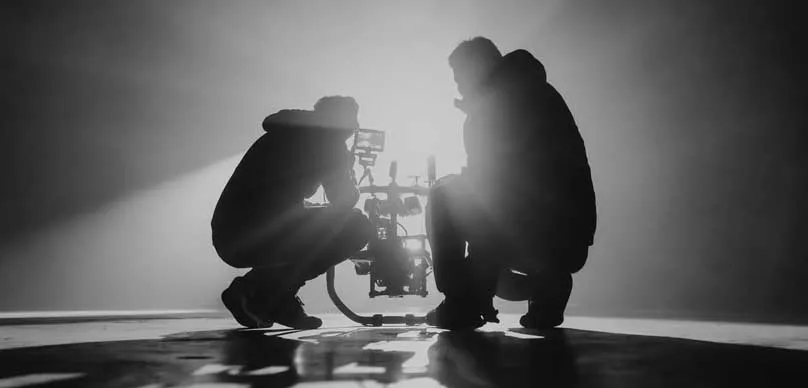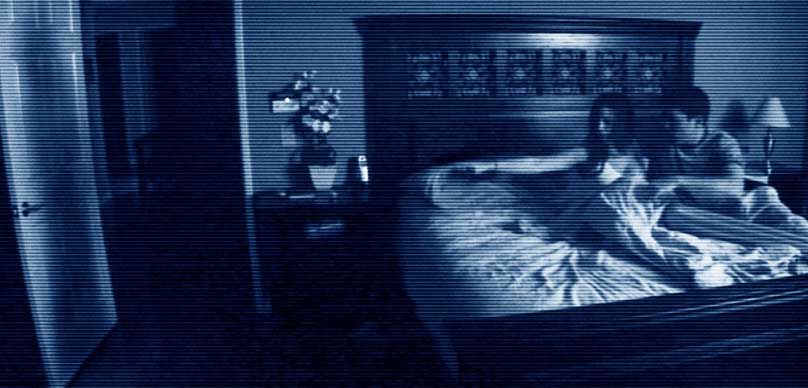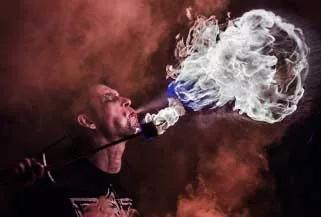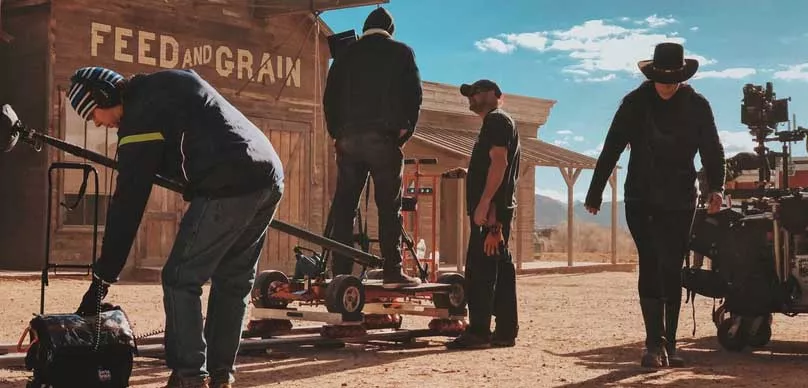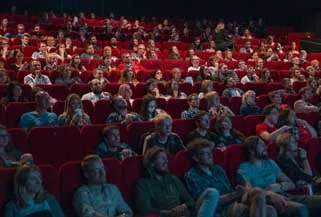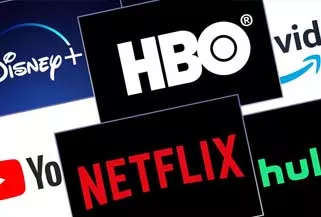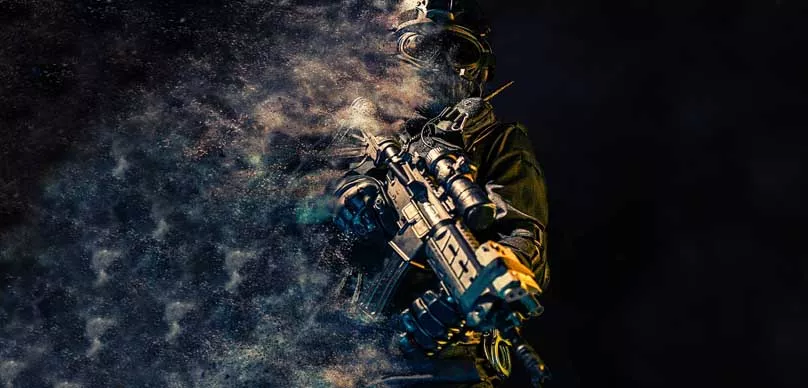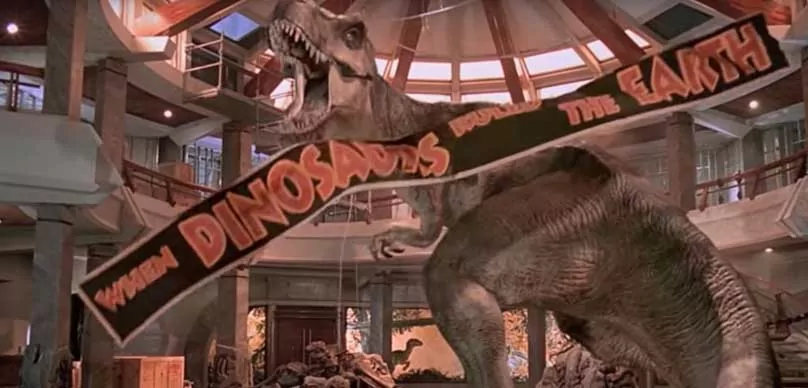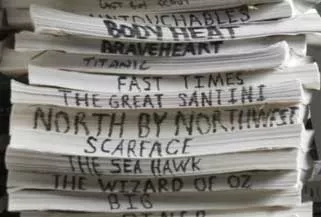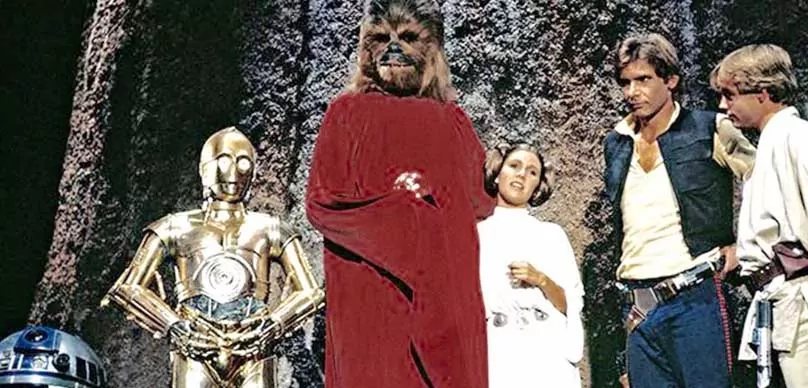The Indie Film Hustle Podcast has been blessed to have the opportunity to speak to many Oscar® winners and nominees. These craftsmen and women had amazing insight into what it takes to make it to the top of the filmmaking craft. Enjoy these remarkable conversations, and we hope to see you at the Oscar®, too, one day.
Click here to subscribe on Apple, Spotify, & Youtube.
The Daniels
Daniel Kwan and Daniel Scheinert, collectively known as DANIELS, have been writing and directing together for over a decade, initially with a slew of viral music videos, commercials, and short films, then with feature films and TV directing.
They’ve developed a reputation for combining absurdity with heartfelt personal stories. Oftentimes they incorporate a unique brand of visual effects and visceral practical effects into their genre-blending projects.
They have directed music videos for Manchester Orchestra, Foster, the People, and won a VMA for their video for “Turn Down For What,” in which Scheinert bullied Kwan into being the lead actor. Kwan is a really good dancer.
They wrote and directed the feature film Swiss Army Man starring Paul Dano and Daniel Radcliffe, which went on to win the Directing Award at the Sundance Film Festival, received multiple nominations, and gained a large cult following.
While they were writing & developing their Oscar® Winning movie Everything Everywhere All At Once, a kung fu sci-fi dramedy starring Michelle Yeoh, Scheinert went and directed a small redneck dramedy called The Death of Dick Long, also released by A24.
Oliver Stone
Today on the show, I bring you one of the most influential and iconic writers/directors in the history of cinema, three-time Oscar® winner Oliver Stone. Throughout his legendary career, Stone has served as a writer, director, and producer on various films, documentaries, and television movies. His films have been nominated for forty-two Oscars® and have won twelve.
Richard Linklater
We are joined by indie film icon and Oscar® nominated writer/director Richard Linklater. Richard was one of the filmmakers who helped launch the independent film movement we know today with his classic 1991 indie film Slacker. As a bonus, we will dive into not only the extraordinary career of Richard Linklater but also that of collaborator and longtime friend writer/director Katie Cokinos, the filmmaker behind the film I Dream Too Much.
Edward Zwick
We have been on a major roll lately on the podcast, and this episode keeps that going in a big way. Today’s guest on the show is Oscar® Winning writer, producer, and director Edward Zwick. Edward made his big shift from his childhood passion for theater to filmmaking after working as a PA for Woody Allen in France on the set of Love and Death.
John Sayles
John Sayles is one of America’s best-known independent filmmakers, receiving critical acclaim for films including Eight Men Out (1988), Lone Star (1996), and Men with Guns (1997). He’s also written screenplays for mainstream films such as Passion Fish (1992), Limbo (1999), and The Spiderwick Chronicles (2008) and did a draft of Jurassic Park (1993) for Steven Spielberg.
Neill Blomkamp
Ever since I saw District 9 and learned of all the mythical stories behind the short film becoming a feature, I have been a massive fan of today’s guest, Neill Blomkamp. Though Neill is here today to talk about his new sci-fi horror fiction film, Demonic, we also chatted up about his other films that have been successful over the years.
Taylor Hackford
Sitting down with one of the big names in this business this week was a really cool opportunity. I am honored to have on the show today, Oscar® winning director, producer, and screenwriter, Taylor Hackford.
Taylor’s has directed films like An Officer and a Gentleman (1982), White Nights (1985), Proof of Life (2000), Dolores Claiborne (1995), Against All Odds (1984), Parker (2013), the iconic Ray Charles biopic, Ray of 2004, and The Comedian (2016) just to name a few. He also has served as president of the Directors Guild of America and is married to the incomparable acting legend Helen Mirren.
Sean Baker
Sean Baker is a writer, director, producer, and editor who has made seven independent feature films over the course of the past two decades. His most recent film was the award-winning The Florida Project (2017) which premiered at the Cannes Film Festival and was released by A24 in the U.S. Among the many accolades the film received — including an Oscar nomination for Willem Dafoe for Best Supporting Actor — Sean was named Best Director by the New York Film Critics Circle.
His previous film, Tangerine (2015) premiered at the Sundance Film Festival and won an Independent Spirit and two Gotham Awards. Starlet (2012) was the winner of the Robert Altman Independent Spirit Award, and his previous two features, Take Out (2004) and Prince of Broadway (2008), were both nominated for the John Cassavetes Independent Spirit Award.
John Lee Hancock
I have an epic conversation in store for you all today. Our guest is an Oscar-nominated screenwriter and filmmaker, John Lee Hancock. While working as a lawyer by day back in 1986, John moonlighted as a screenwriter, writing script after script. His spec script, A Perfect World, caught the eye of Steven Spielberg and was eventually directed by Clint Eastwood.
Hancock’s famous five-year hiatus comeback film, The Blind Side, an adaptation of Micheal Lewis’s 2006 book, The Blind Side: Evolution of a Game yield and performed outstandingly. The film received countless major awards nominations, including an Academy Award nomination for Best Picture and a win for Best Actress for Sandra Bullock.
The Blind Side is the story of Michael Oher, a homeless and traumatized boy who became an All-American football player and first-round NFL draft pick with the help of a caring woman and her family. The Blind Side went on to make $309.2 million internationally on a $29 million budget. Not too bad.
Simon Kinberg
Today on the show, we have Oscar® and two-time Emmy® Nominee Simon Kinberg. He has established himself as one of Hollywood’s most prolific filmmakers, having written and produced projects for some of the most successful franchises in the modern era. His films have earned more than seven billion dollars worldwide.
Kinberg graduated from Brown University and received his MFA from Columbia University Film School, where his thesis project was the original script, “Mr and Mrs Smith.” The film was released in 2005, starring Brad Pitt and Angelina Jolie.
Kevin MacDonald
On the show today is academy award-winning documentary and film director and producer Kevin Macdonald. He is one of few directors who seamlessly dance the line of film and documentary. He directed documentaries like Whitney (2018), the crowdsourced documentary – Life in a Day (2011), and Marley (2012), among others.
He is famously known for his 2006 drama film, The Last King of Scotland, starring Oscar-winning best actor Forest Whitaker. Kevin has made a huge name for himself and his work over his 27 years in the industry – dabbling in commercials, films, and documentaries.
As a boy, his granddad, Emeric Pressburger, a legendary filmmaker in the 1940s, lit his passion for filmmaking. When his grandfather passed, Kevin wrote a biography in 1994 about his grandad’s life journey, titled, ‘ The Life and Death of a Screenwriter’, which he later made into a documentary, ‘The Making of an Englishman’ (1995). This was the start of his becoming a documentary maker.
In 1999 he directed the Box office hit and Oscar-winning documentary, One Day in September, which is about the 1972 Munich Olympic Games massacre, featuring a lengthy interview with Jamal Al-Gashey, the last known survivor of the Munich terrorists.
This project catapulted his career big time. He then made the adventure-docudrama, Touching the Void, another critically acclaimed film that won Best British Film at the 2003 BAFTA. The true story of two climbers and their perilous journey up the west face of Siula Grande in the Peruvian Andes in 1985.
Reinaldo Marcus Green
Reinaldo Marcus Green is a writer, director, and producer. He most recently directed the critically acclaimed Warner Brothers film King Richard starring Will Smith. The film is nominated for Best Picture at the Critics Choice Awards and was named one of the Top 10 Films of the Year by both AFI, the National Board of Review, and an Academy Award® nomination for Best Picture.
SCREENWRITERS
Eric Roth
This week, I sat down with one of Hollywood’s most legendary and successful screenwriters/producers, Oscar® Winner Eric Roth. Over a 50+ years career, he’s well-known for writing or producing films like Forrest Gump. A Star is Born, Mank, The Curious Case of Benjamin Button, Munich, Ali, and the list goes on.
Jordan Peele
Get ready to have your mind blown! I’ll be releasing a 3-Part Limited Series of conversations between the legendary screenwriter James V. Hart, the writer of Hook, Contact, Bram Stroker’s Dracula, and Tomb Raider, to name a few, and some of the top screenwriters in the game.
First up is the screenwriter that took the world by storm with his Oscar-Winning screenplay Get Out, Jordan Peele. If you have been living under a rock for the past few years, here is what the film is about.
This was recorded before Jordan’s next hit film, Us, was released. Listening to these two masters discuss character, plot, theme, and more is a rare treat. It’s like being a fly on the wall. When you are done listening to this conversation, you can read some of Jordan’s screenplay here.
Alan Ball
Academy and Emmy Award-winning writer/director/producer Alan Ball is among our generation’s most important creative voices. Born in Atlanta, Ball studied Theatre Arts at Florida State University. In March 2000, AMERICAN BEAUTY, Ball’s first screenplay to get produced, won five Academy Awards, including Best Picture and Best Original Screenplay.
Ball went on to create and executive produce the groundbreaking HBO drama SIX FEET UNDER. The series ran for five seasons and received two Golden Globes, six Emmys, and an Emmy and DGA Award for Ball’s direction of the pilot.
Bruce Joel Rubin
He knew instantly he was one with all there was. In the years that followed, Bruce became an Oscar-winning screenwriter, a spiritual teacher, and, most recently, a photographer. Each aspect of his life has been a conscious effort to explore and reveal what he learned in that sandbox.
Damien Chazelle
Today on the show, we have Damien Chazelle, the Oscar® Winning director and screenwriter of La La Land. He burst onto the scene with his debut film, Whiplash. The film is about a young musician (Teller) struggling to become a top jazz drummer under a ruthless band conductor (Simmons).
James and Damien discuss how he wrote and structured La La Land and much more. Enjoy this rare conversation between James V. Hart and Damien Chazelle.
PRODUCERS
Jason Blum
I’m excited to talk to a fellow low-budget independent filmmaker today. Granted, he does low-budget films on a completely different level than I or most people do at this point. But if we are going to talk about budget filmmaking, it is only fitting to have expert horror film and television producer Jason Blum of Blumhouse Productions.
That is a testament to his company’s high-quality production. Blumhouse is known for pioneering a new model of studio filmmaking: producing high-quality micro-budget films and provocative television series. They have produced over 150 movies and television series with theatrical grosses amounting to over $4.8 billion.
Chris Moore
Every once in a while, I have a conversation on this show that blows my mind; this episode did just that. Today on the show, we have Oscar® Nominated producer Chris Moore. He produced films like Good Will Hunting, American Pie, Waiting, The Adjustment Bureau, and Manchester by the Sea. Chris’ profile grew from his appearance as the producer on the early 2000’s filmmaker reality show Project: Greenlight.
After graduating from college, Chris Moore moved to Los Angeles after working in a major agency’s mailroom; he got promoted to a literary agent. He championed projects like The Stoned Age, PCU, Airheads, Last Action Hero, and My Girl.
When ICM acquired Chris’ agency, he left and became an indie film producer. With some friends, he raised the budget to produce the indie film Glory Daze, which starred an unknown Matt Damon. Damon turned down the leading role in favor of paid work on another paid project but introduced him to his friend Ben Affleck, who ultimately starred in Glory Daze.
Afterward, Affleck and Damon wrote the screenplay for what would become the Oscar® winning Good Will Hunting, and they asked Chris to help them produce the film that Gus Van Sant directed.
Chris and I had a remarkable conversation about how to produce films in today’s eco-system. We also discuss what it’s like working in the studio system, some of his issues with the system, how filmmakers are treated, and so much more. This an EPIC 2-hour conversation full of knowledge and truth bombs, so prepare to take some notes.
Enjoy my conversation with Chris Moore.
Gary W. Goldstein
Today, we are hearing from one of the cultural influencers of the 90s film industry, and that’s non-other than Gary Goldstein, the Oscar Nominated producer of the iconic rom-com Pretty Woman, starring Richard Gere and Julia Roberts.
Pretty Woman was most of your introduction to Gary’s work, but mine was Cannibal Women in the Avocado Jungle of Death. I know. After all these years, the title still makes me chuckle. Years later, I would reference the title to people. And in case you were curious, Gary goes into the movie title origin story in this interview.
Gary films have generated well over one billion dollars – consistent box office hits. Pretty Woman, for example, grossed $463.4 million – more than 30 times its budget. After the massive success of Pretty Woman, Gary collaborated once more with his filmmaking partner, writer Jonathan Lawton to produce the action thriller, Under Seige, in 1992. Like Pretty Woman, this too performed successfully at the box office and critically – including an Academy Award nomination. An ex-Navy Seal turned cook is the only person who can stop a group of terrorists when they seize control of a U.S. battleship.
In 2013 he authored Conquering Hollywood: The Screenwriter’s Blueprint for Career Success, which is a compilation of strategies to help anyone, whether looking to sell a spec script, option a screenplay, land a writing assignment, and get hired, attract an agent or manager of your dreams…or get a producer to take a meeting with you. Gary blessed us with knowledge bombs in this interview, including tips on entrepreneurship and film as a business. Enjoy my conversation with Gary Goldstein.
Cassian Elwes
Cassian Elwes began his producing career with 1984’s Oxford Blues, starring Rob Lowe and Ally Sheedy, and has enjoyed continuing success in film. His earlier roles include Men at Work with Emilio Estevez and Charlie Sheen, The Chase with Charlie Sheen, Kristy Swanson, and Henry Rollins, and The Dark Backward with Judd Nelson, Bill Paxton, and Rob Lowe. In 1989 he produced the independent film Never on Tuesday, which featured a cast of cameos including Charlie Sheen, Emilio Estevez, Judd Nelson, Nicolas Cage, and Cary Elwes.
The Hollywood Reporter has said that Elwes was “involved in a virtual who’s who of every great independent film of the last ten years.” with films such as Thank You for Smoking, Half Nelson, and Frozen River (the last two of which garnered Oscar nominations for Ryan Gosling and Melissa Leo, respectively).
David Permut
The first interviewee in my Sundance Film Festival Interview Series is legendary producer David Permut. David has produced almost 40 feature films in the course of his career. From Blind Date and Dragnet to Face/Off and the Oscar® Nominated Hacksaw Ridge. His new film, The Polka King starring Jack Black, just got released on Netflix.
Enjoy my interview with David Permut.
Marshall Herskovitz
Our guest today is producer, director, and screenwriter Marshall Herskovitz. Many of his production projects have been in partnership with his long-time filmmaking collaborator, Edward Zwick, whose films he’s produced and written half of. Their decades-long filmmaking partnership was launched as co-creators of the 1987 TV show, ThirtySomething.
ACTORS
Billy Crystal
Some performers impact your life without you even knowing it and today’s guest fits that bill. On the show, we have comedic genius, multi-award-winning actor, writer, producer, director, and television host, Billy Crystal. We’ve seen Billy’s versatile work across all areas of the entertainment world, stand-up, improv, Broadway, behind and in front of the camera, feature films, television, live stages like SNL, and animated movies.
Edward James Olmos
Our guest today is 80s star, multiple-award film and theater actor, and activist Edward James Olmos. Olmos’s roles in films or TV shows like Stand and Deliver, Battlestar Galactica, broadway musical and film Zoot Suit, Blade Runner as detective Gaff, and many others are some of the most memorable of all time, and he’s still dominating our screens. While I could not resist discussing his iconic roles over several decades, we mainly discussed Olmos’s new must-see film, Chasing Wonders.
Robert Forster
This week we are joined by legendary actor Robert Forster. Robert has been a working actor for decades, appearing in classic films like Medium Cool, the iconic John Huston’s Reflections in a Golden Eye, 80’s action classic Delta Force (love me a good 80’s action flix), and Disney’s The Black Hole (one of my favorite films growing up).
He was nominated for an Academy Award for Best Supporting Actor in 1997 for Quentin Tarantino’s Jackie Brown, which he credits with reviving his career. Since then, Robert has been on fire in the second half of his career, appearing in The Descendants, Like Mike; Mulholland Drive; Me, Myself, & Irene; Lucky Number Slevin, and Firewall, to name a few.
CINEMATOGRAPHERS & PRODUCTION DESIGNERS
Jeff Cronenweth A.S.C.
Today on the show, we have Oscar® nominee Jeff Cronenweth A.S.C.
Cronenweth worked as a loader and 2nd assistant before graduating high school and then enrolled in film school at USC, where he studied cinematography. Among his classmates were John Schwartzman and Robert Brinkmann, as well as director Philip Joanou.
After graduation, Cronenweth resumed working with his father, joining a core camera team that included operators John Toll and Dan Lerner and 1st assistants Bing Sokolsky and Art Schwab.
Jeff worked with their father, Jordan Cronenweth (cinematographer most notable for Blade Runner), as a camera loader and second assistant camera during high school, working his way up to the first assistant camera and then camera operator until the mid-1990s.
Moving up to the first assistant, Cronenweth began working with Toll, who was beginning his work as a cameraman, and veteran Sven Nykvist.
David Fincher’s masterpiece Fight Club was the first major motion picture where he acted as a DP. Other notable feature films on which he worked as a DP are One Hour Photo, K-19: The Widowmaker, Down With Love, The Social Network, Hitchcock, The Girl with the Dragon Tattoo, and Gone Girl.
Dean Cundey A.S.C
Today, my guest is Oscar® nominated prolific cinematographer, accomplished photographer, and member of the American Society of Cinematographers, Dean Cundey A.S.C.
Dean rose to fame for extraordinary cinematography in the 1980s and 1990s. His early start was working on the set of Halloween. Dean is credited as director of photography on five Back To The Future films and Jurassic Park.
Cundey holds over one hundred and fifty cinematography & photography credits for movies, television, and short films. That is no small feat in this business. The man has stayed busy and booked since graduation from film school. That kind of consistency in Hollywood is only doable with extreme persistence and excellence.
One of the many things he did to stay prepared and on top of his craft was investing in building himself a ‘super van’ or one couple call it a cinematographer’s heaven that contained every equipment (cameras, editings tools, etc.) required to help him get work get and do work easily.
We also talk more about Dean joining The Book of Boba and The Mandalorian crew.
Russell Carpenter A.S.C
I can’t tell you how excited I am about today’s guest. I sat down with the legendary and Oscar® Winning Cinematographer Russell Carpenter A.S.C. Russell has been shooting blockbusters for over 40 years and has shot films like Ant-Man, xXx: Return of Xander Cage, Charlie’s Angels, The Negotiator, True Lies, Monster-in-Law and classic 90’s action flicks like Hard Target, The Perfect Weapon, and Death Warrant. He just finished Avatar 2: The Way of Water.
He won the Oscar® for his cinematography on the second highest-grossing film of all time, Titanic. We go down the rabbit hole on shooting Titanic, working with James Cameron, crazy Hollywood stories, how he approaches each project, and much more. This episode is a treasure chest of behind-the-scenes stories and cinematic techniques from the highest levels of Hollywood.
Erik Messerschmidt A.S.C
Award-winning director of photography Erik Messerschmidt, ASC, has a natural eye for arresting and spellbinding images, thriving in a role that allows him to combine his love of art, craft, and science. Recently, he lensed Devotion for director J.D. Dillard, based on the real-life story of a Black naval officer who befriends a white naval officer during the Korean War, with both becoming heroes for their selfless acts of bravery.
He also is currently shooting Michael Mann’s biographical film Ferrari, starring Adam Driver, Shailene Woodley, and Penélope Cruz, and recently completed shooting David Fincher’s The Killer, starring Michael Fassbender and Tilda Swinton.
Janty Yates
Today on the show, we have Oscar® winning costume designer Janty Yates. Janty Yates has had a collaborative relationship with Ridley Scott since the great success of Gladiator in 2000, for which she won an Academy Award®, one of the eight Oscars® garnered by the film.

